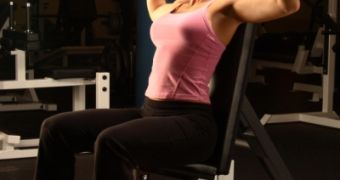While this is not the first time it has been showed that exercising at the workplace is not only highly recommended especially in the case of a more sedentary job, but also very beneficial, it is the first in terms of proving that working out comes to boost productivity, as well as reduce stress. Researchers at the University of Bristol have concluded that physical exercise right before going to work or during lunch break comes to make employees happier, while also boosting their self-confidence and workflow.
“On exercise days, people's mood significantly improved after exercising. Mood stayed about the same on days they didn't, with the exception of people's sense of calm which deteriorated,” said Research Associate in the University's Department of Exercise, Nutrition and Health Sciences, Jo Coulson. “Critically, workers performed significantly better on exercise days and across all three areas we measured, known as mental-interpersonal, output and time demands,” Coulson added.
The study, performed on 200 employees from an IT firm and a pensions company, also took into account the behavior of those who chose not to take part in it, in that it compared answers from the former with those from the latter. The 200 participants were already working out regularly before being included in the study, and got to choose for themselves the type and intensity of exercise, so as to mimic real-life situations. The conclusion was just one: exercising before or during work hours equips people best for whatever the day throws in their way, making them calmer, more alert and less stressed.
“It's generally well-known now that there are many physical and mental health benefits that can be gained from regular exercise. If people try to fit an active break into their working day, they might also experience the added bonus of their whole day feeling much more productive. And that always feels good in our busy lives,” Coulson revealed, adding that we couldn’t fully know the benefits of such a change until, obviously, we had tried it out for ourselves.

 14 DAY TRIAL //
14 DAY TRIAL //